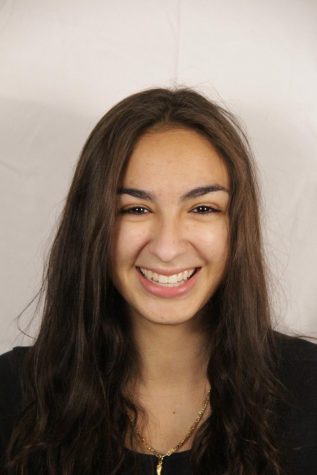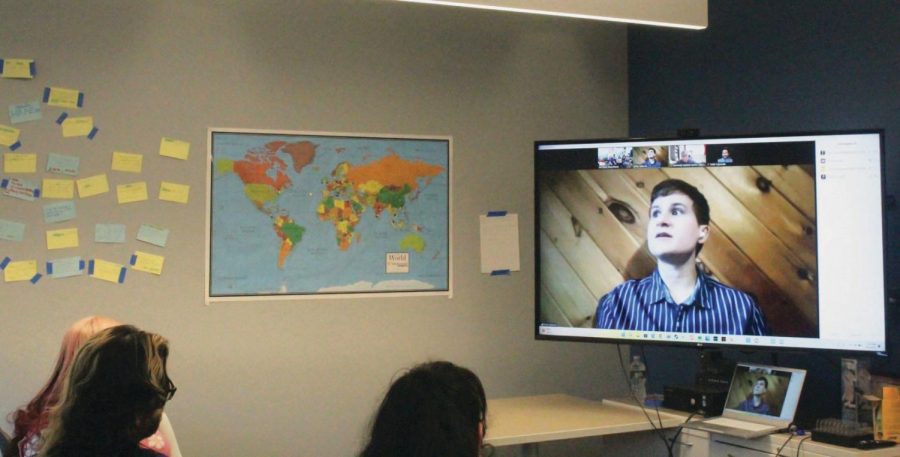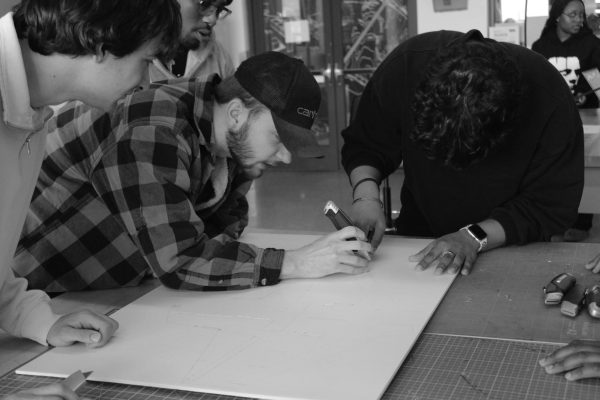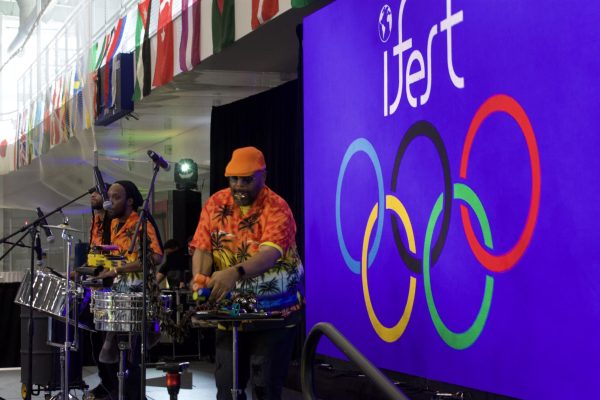‘Out at Work’ panel facilitates conversation about being LGBTQ+ in the workplace
Photo courtesy of Charger Bulletin/Charlotte Bassett.
Erika Sabovik speaks to students via Zoom, West Haven, Oct. 6, 2022.
Just a few days before National Coming Out Day, the Myatt Center hosted an event in light of LGBTQ+ History Month during which a set of individuals tuned in via Zoom to speak to students about being open about their identities in their place of work. This is the second year in a row that the Out at Work panel was conducted.
Assistant Director of LGBTQ+ Resources Ian Shick opened the event with an introduction to its goals and purpose, saying, “This is an event that allows and is for LGBTQ students to get an opportunity to talk to people in the real world who are LGBTQ employees about their experience and what it was like for them in their respective fields.”
Shick said that questions asked aimed to learn more about “their journeys, and sort of how being out or not being out played into their professional roles or professional journeys.”
The two panelists for the evening were Geronda Wollack-Spiller, who is a diversity, equity and inclusion (DEI) manager at a small company based out of Seattle, and Erika Sabovik, who currently works in a school system and is based out of Shelton, Conn.
Wollack-Spiller introduced herself, speaking on her background in human resources and how she transitioned into DEI work. She discussed the struggles of finding other members of the community in her workplace, and the downfalls of having limited resources to support LGBTQ+ people.
“Going through my career, I just kept feeling like I wish I had somebody who could tell me how to navigate all of this,” she said. In her prior line of work, Wollack-Spiller felt herself drawn to the realm of DEI work, and the potential to guide others in marginalized communities.
In terms of how her identity played into her decision to enter DEI work, Wollack-Spiller said that she “felt othered” often, which she found made it challenging to be herself at work.
As a lesbian Black woman, Wollack-Spiller also spoke on how there is an overlap when you have identities that fall into different minority groups, and also said that she felt she had to “mold myself to fit into that particular culture” of the professional world she had entered, and said “I didn’t know that I also had the choice to be myself.”
Wollack-Spiller discussed how she grew to realize what she would and would not tolerate in the workplace and, in a message to individuals entering the working world, she said to “really think about what you value and what you identify yourself with and try and find companies and do things that align with that.” She said that getting work experience is important, but not if it tears down your identity or who you are as a person.
Sabovik talked about how their identity, which was trivial for them in college, was expected to play a large role in her career, until the pandemic hit and landing a job became more essential.
They currently teach in a middle school, and said she is only one of about two members of a 50-person staff who are out to their students.
In her entry to the workforce, Sabovik said that “I defintiely was never going to pretend that I wasn’t queer,” as it is a large part of who they are.
Sabovik said that “It’s been an interesting time for me to go from college and really being involved in GSA [Gay-Straight Alliance] and with a lot of queer people, to a place where, even though I don’t really think about it a lot, I am one of the only queer people.” They ended up starting a lunchtime GSA program for the students at her middle school.
At one point in the panel discussion, Shick asked both guest speakers how their identities empowered them in their careers.
For Wollack-Spiller, “being lesbian and advocating for the community started giving me some confidence in advocating not only for myself but different projects that I’m working on; processes I want to update, and I would look at things in the lens of how it’s going to affect other people.”
She said it was important to consider historically marginalized voices and groups often, and that “coming with a different experience [from people who are not LGBTQ+] I was always okay to be vulnerable,” and advocate for other marginalized voices and share an open perspective on how others could be impacted.
For Sabovik, starting the GSA program for the middle-schoolers was very important to them. For many kids, parents may not be welcoming, or kids may not be out yet. At Sabovik’s school, after-school programs required transparency with parents to give permission for students to attend, so in order to avoid having to out them in order to host the program, she found the solution of hosting the open space during lunchtime.
She said that they realized that “in the future of my career, I want to be doing more for the community.”
Throughout the rest of the month, a number of events are taking place across campus to highlight LGBTQ+ History and experiences. To stay up-to-date, check the Myatt Center’s calendar for a rundown of what’s to come.

Mia Adduci is a senior studying communication concentrating in multi-platform journalism and media who began writing for the paper her first semester on...











